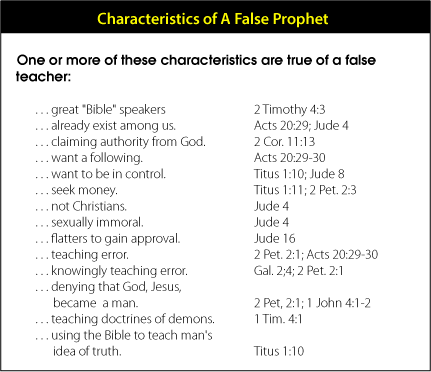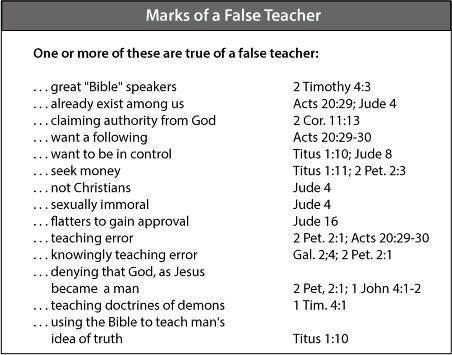Recently the leader of a well known ministry for weight loss has been teaching that “Jesus and God are two separate beings!” “The head of Christ is God” and “God was, then the Son (firstborn).” This teacher denies the trinity and advocates that God the Father, God the Son, and God the Spirit are separate beings. This teacher clearly states the Father is God and the Spirit is God’s spirit. When asked if Jesus was created, the response given is “Jesus is from God, begotten by God, from God, sent from God, firstborn . . .” This teacher goes on to say, ” . . my credentials are If I were a bad tree, you would not be hearing from the thousands who have given themselves over to total Lordship of God Almighty through Jesus Christ and proven it by turning away from any stronghold . . . The continual defining summaries I hear . . . are: I have been in church all my life, but I have never heard this before, or in this light, . . . this is a revolutionary teaching and it has changed my entire life . . . Many have reported that their churches have had revival as a result . . . We have truckloads of testimonies that are still coming in daily.” Would Jesus condemn this teaching? Listen to Jesus,
Beware of the false prophets, who come to you in sheep’s clothing, but inwardly are ravenous wolves. Matthew 7:15 (NASB)
The False Prophet
Jesus does not sound very accepting of other points of view. Many will agree with Jesus’ principle but few want to apply this principle because “that would be unloving” or “judgmental.” In recent times a nationally known ministry has said that Christians need to minimize doctrine and emphasize love for one another. This has the appearance of godly wisdom, but the principle does not agree with Jesus’ teaching.
Jesus has no problem contradicting the false teaching of the Pharisees, Sadducees, and scribes. The picture Jesus paints of these false teachers is one of false appearances. They appear great. They are usually dynamic speakers and consequently able to influence opinion. They talk about the Lord in godly terms. Their character is charismatic. They may even be physically attractive and may appear very knowledgeable about the scriptures. If they could not quote scripture and did not sound like they knew what they were talking about, no one would believe them. That is Jesus’ point. They look good – like sheep. But they are not sheep; they are wolves. No, they are ravenous wolves.
The Greek word Jesus uses for “ravenous” is harpax. This word means “to take something forcefully.” From it we get the idea of “ravenous.” So a false teacher is one who is cunning and deadly.

Marks Of A False Prophet
Jesus tells us how to know the marks of a false prophet.
You will know them by their fruits. Grapes are not gathered from thorn bushes, nor figs from thistles, are they? Even so, every good tree bears good fruit; but the bad tree bears bad fruit. A good tree cannot produce bad fruit, nor can a bad tree produce good fruit. Every tree that does not bear good fruit is cut down and thrown into the fire. So then, you will know them by their fruits. Matthew 7:6-20 (NASB)
The marks of a false prophet are bad fruit. If you see bad fruit, you know the nice-looking sheep is really a wolf. A wolf is worse than the pig or dog as we saw in Matthew 7:1-6. The gospel of Luke adds the following,
For each tree is known by its own fruit . . . Luke 6:44 (NASB)
Jesus’ point is simple. Their fruit reveals who they are.
So what kind of fruit should we look for from a false prophet? The answer can be found in a few major passages that talk about false teachers and false prophets. These passages are as follows: Acts 20:28-30; 2 Corinthians 11:13; Galatians 1:7; 2:4; 1 Timothy 4:1-2; 2 Timothy 4:3; Titus 1:10-11; 2 Peter 2:1-3; 1 John 4:1-2; 2 John 7; Jude 4-16. A false prophet and false teacher are not easily discovered because they sound great, look great, and “know” their Bible. They do not want to be subject to anyone in the church – they want to be in control of the church. They are not interested in people. They are interested in themselves. They seek their own pleasure.
This is not new. The Old Testament priests were condemned for the same things by God. He accused them of “prophesying falsely and ruling on their own authority” (Jeremiah 5:30-31), committing adultery (Jeremiah 23:14), serving for money (Micah 3:11), and being partial in their instruction (Malachi 2:7-8).

Modern Trends
Today, Christians know less and less of the scriptures. As a result, they know less about God and are more easily led away into doctrinal error by some false teacher or false pastor. The following series of statements from The Coming Evangelical Crisis captures the message well.
We are often confronted with the line that, since good Christians arise under every form of faith on practically every point of doctrine, it cannot be of much importance what people believe. So why argue over such things? It is certain that many in our midst take such a stance. They fear controversy more than error. We agree that there are limits to be set for the controversial spirit, but these limits are not to be sought in motives of convenience or prudence. An anemic Christianity that is not virile enough to strive for the truth can never possess the nerve to die for it. A truth not worth defending very soon comes to be seen as a truth not worth professing . . . We do well to be concerned over doctrinal apathy within evangelicalism . . . Why make over what appears to be minor points of difference among those who serve the one Christ? . . . “Creeds” they shout, “are divisive things ; away with them!” If there must be such things, at least let us prune all their distinctive features away . . . [1]

This quote is from R. C. Sproul,
Part of our problem is the disdain for theology that abounds in Christian circles. Although theology is taken from two words that, together, mean ‘the study of God, many brothers and sisters prefer shortcuts to “relevance.” To say that theology is boring is really to say that God is boring.[2]
Now from John Hannah,
. . . in the quest to make the modern church more important to society, the church is finding itself less appealing to an increasingly apathetic world because it has little to offer that is distinctive. Our growing accommodation of the gospel message to immediate, felt needs . . . may well cause the church to forget that its true work is about an indescribable miracle of God’s grace and that its message is ultimately about something we can neither explain nor cause by self-effort and exertion.[3]
Finally from Michael Horton,
What becomes plain is that, when we downplay theology . . . before long we lose the content of Scripture. And not long after our loss of biblical content follows the loss of the authority of Scripture all together. In practice, it becomes a helpful resource for practical living . . . What is the most significant expected gain from Bible study? Only 9.3 percent answered that it “helps me to be knowledgeable about my faith.” While instruction for [how to live my] life won 58 percent, and 32.1 percent answered that it “helps discern God’s speaking to me . . .” Obviously, this says more about the pragmatic and subjective orientation of popular culture than anything else. . . . Apostasy begins harmlessly enough. First, we are told that we do not need creeds, confessions, and catechisms . . . The result is that the Scriptures go before long. Next, we are asked to tone down on our doctrinal distinctives and emphasize that which unites all religious people of goodwill. The result of this is the rejection of the gospel. Finally, we are told, “All we need is Jesus,” and we are left with a moral crusader.[4]
These quotes reveal a problem. Many pastors and teachers do not really want to know God and His Word. They are seeking an experience from the Holy pages. As a result, Christians do not know their Bible nor their God like they should. We spend more time reading books about God and about the Bible than we do the Bible. As a result Christians are open to false teaching and are increasingly willing to accept a teacher who is not spiritually qualified to teach, including a false teacher.
Conclusion
There are many faithful shepherds today who make mistakes once in awhile in their teaching and preaching. They study hard and they are true to God’s Word. Their lives show a constant pattern of godliness. Jesus is not talking about men like these. He is talking about pastors and teachers who are watering down the Word of God to win favor with those in the church. He is talking about those who twist scripture to make it say what they want it to mean. In a private conversation one day, a pastor of a very large church admitted that he did not believe Jesus was virgin born or that Jesus was really God in human flesh. He believed what was important was Jesus’ moral teachings. I have wondered how many in his church really knew what he believed. What was his spiritual life like?
Today, we need to learn the scriptures like the Bereans (Acts 17:11). We need to evaluate their sermons for truth. We need to look at the lives of our teachers and pastors to determine if their walk with God reveals bad fruit. If we see bad fruit, then their message is also suspect.
Hebrews 13:7 tells us,
Remember those who led you, who spoke the word of God to you; and considering the result of their conduct, imitate their faith. Hebrews 13:7 (NASB)
The Holy Spirit is calling us to evaluate the spiritual life of those who teach or preach the Word of God to us. Their charm, nice personality, wonderful message, their humor and good looks must not cause us to automatically follow them.
We are to follow those who accurately teach and preach the Word of God. Jesus wants us to inspect the fruit of their spiritual lives as well!
References:
1. Gary L. Johnson, “Does Theology Still Matter?” The Coming Evangelical Crsis. Moody Press.. 1996. p. 65-67.
2. R. C. Sproul, quoted by Michael Horton,”Recovering The Plumb Line” The Coming Evangelical Crsis. Moody Press.. 1996. p. 245-265.
3. John D. Hannah, “Evangelicalism, Conversion, and The Gospel: Have We Sold Our Hertigate For Relevance?” The Coming Evangelical Crsis. Moody Press.. 1996. p. 168-169.
4. Michael Horton, “Recovering The Plumb Line” The Coming Evangelical Crsis. Moody Press.. 1996. p. 258-259.
Suggested Links:
False Teachers & Their FollowersWhat does tolerate mean in Revelation 2:20? – They tolerated Jezebel
Mormons claim that they have present day prophets. Is this true?
Have you heard of N. T. Wright and the New Perspective on Paul?
Should I leave since I do not agree with the doctrine of the church?